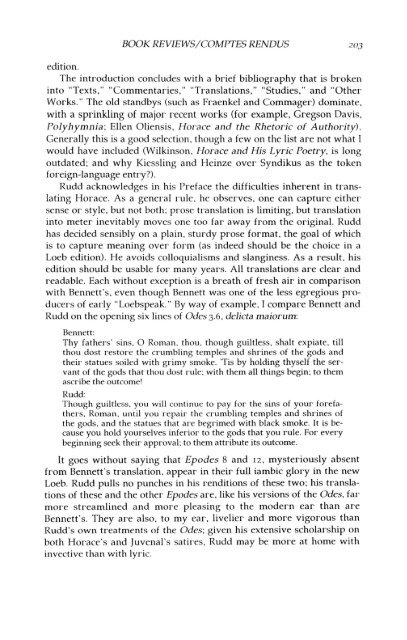MOUSEION - Memorial University of Newfoundland
MOUSEION - Memorial University of Newfoundland
MOUSEION - Memorial University of Newfoundland
Create successful ePaper yourself
Turn your PDF publications into a flip-book with our unique Google optimized e-Paper software.
BOOK REVIEWS/COMPTES RENDUS 203<br />
edition.<br />
The introduction concludes with a brief bibliography that is broken<br />
into "Texts," "Commentaries." "Translations." "Studies," and "Other<br />
Works." The old standbys (such as Fraenkel and Commagel') dominate.<br />
with a sprinkling <strong>of</strong> major recent works (for example, Gregson Davis,<br />
Polyhymnia: Ellen Oliensis. Horace and the Rhetoric <strong>of</strong> Authority).<br />
Generally this is a good selection. though a few on the list are not what I<br />
would have included (Wilkinson. Horace and His Lyric Poetry, is long<br />
outdated: and why Kiessling and Heinze over Syndikus as the token<br />
foreign-language entry?).<br />
Rudd acknowledges in his Preface the difficulties inherent in translating<br />
Horace. As a general rule. he observes. one can capture either<br />
sense or style, but not both; prose translation is limiting. but translation<br />
into meter inevitably moves one too far away from the original. Rudd<br />
has decided sensibly on a plain. sturdy prose format. the goal <strong>of</strong> which<br />
is to capture meaning over form (as indeed should be the choice in a<br />
Loeb edition). He avoids colloquialisms and slanginess. As a result. his<br />
edition should be usable for many years. All translations are clear and<br />
readable. Each without exception is a breath <strong>of</strong> fresh air in comparison<br />
with Bennett's, even though Bennett was one <strong>of</strong> the less egregious producers<br />
<strong>of</strong> early "Loebspeak." By way <strong>of</strong> example. I compare Bennett and<br />
Rudd on the opening six lines <strong>of</strong> Odes 3.6. delicta maiorum:<br />
Bennett:<br />
Thy fathers' sins. 0 Roman. thou. though guiltless. shalt expiate. till<br />
thou dost I'estore the crumbling temples and shrines <strong>of</strong> the gods and<br />
their statues soiled with grimy smoke. 'Tis by holding thyself the servant<br />
<strong>of</strong> the gods that thou dost rule: with them all things begin: to them<br />
ascribe the outcome'<br />
Rudd:<br />
Though guiltless. you will continue to pay for the sins <strong>of</strong> your forefathers.<br />
Roman. until you repair the crumbling temples and shrines <strong>of</strong><br />
the gods. and the statues that are begrimed with black smoke. It is because<br />
you hold yourselves inferior to the gods that you rule. For every<br />
beginning seek their approval: to them attribute its outcome.<br />
It goes without saying that Epodes 8 and 12, mysteriously absent<br />
from Bennett's translation. appear in their full iambic glory in the new<br />
Loeb. Rudd pulls no punches in his renditions <strong>of</strong> these two: his translations<br />
<strong>of</strong> these and the other Epodes are. like his versions <strong>of</strong> the Odes. far<br />
more streamlined and more pleasing to the modern ear than are<br />
Bennett's. They are also. to my ear. livelier and more vigorous than<br />
Rudd's own treatments <strong>of</strong> the Odes; given his extensive scholarship on<br />
both Horace's and Juvenal's satires. Rudd may be more at horne with<br />
invective than with lyric.

















